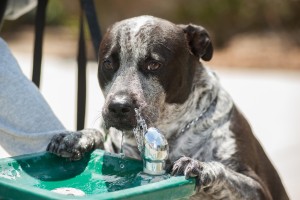A common question we get asked is “how much fluid should I drink per day, and what type of fluid?”
The answer can be complicated and depends on who you are, where you are and what you are doing. Thankfully there is a really simple way of telling whether you are drinking enough fluid. More on that later.
The old adage of 8 glasses of water a day is flawed, mainly because it takes no notice of the age, size and medical history of the person, what level of activity they are engaged in or their environment.
Your body is made up of 60-70% water and the right body water balance is essential for your cells to function properly. The consequences of not getting your fluid intake right could be quite serious. Too little fluid will leave you dehydrated causing lethargy, headaches and in extreme cases increasing your risk of higher body temperature and heat stroke, especially in summer . Over a long period of time, chronic low fluid intake may increase your risk of developing painful kidney stones and subsequent kidney damage as minerals in the urine concentrate and crystallise.
On the other hand, drinking too much fluid can be troublesome too. One of the most common causes of going to the bathroom too frequently is excessive fluid intake. When the amount of fluid taken is greater than the ability of the kidneys to regulate it, fluid retention occurs. This can lead to weight gain, heart and lung problems and in extreme cases, brain swelling, coma and even death.
One of the simplest ways to tell whether you are drinking enough fluid is to look at the colour of your urine. If it is light yellow or clear then you are well hydrated. A more concentrated yellow colour means dehydration and dark urine is a sign of very serious dehydration. Of course there are other conditions that can alter the colour of the urine such as blood in the urine, urinary tract infections, ingestion of multivitamins and high intake of foods such as beetroot and carrots. A hydration indicator can assist in determining how hydrated you are.

If you are outside in a warm climate and doing exercise, you will need to drink more than if you are in an air conditioned office sitting at a desk. First thing in the morning you will need to drink a couple of glasses of water to overcome the dehydration of fasting overnight.
When assessing how much fluid you take in over a day you should include all drinks and also keep in mind that many foods such as watermelon and lettuce are over 90% water. As far as what type of fluid is best, yes water is best, but one or two cups of tea or coffee, the occasional sugar flavoured drink and one to two units of alcohol per day are within recommended guidelines. Remember that alcohol and caffeine are diuretics (will make you pee more and need to rush to the toilet) and that too many sugary drinks will lead to weight gain and increase the risk of diabetes in the long term. The best fluid for rehydrating is water, boring but true!
Unless you are going to be exercising vigorously beyond 60 minutes, water is fine for fluid replacement during and after exercise. For exercise beyond 60 minutes, salt loss needs to be considered and there is a place for electrolyte or salt containing fluids. If you are undertaking serious training, a sports physiologist should be consulted, and a sweat test arranged as salt loss is variable amongst individuals.
Drinking 500ml of water prior to a meal will encourage an early feeling of fullness and thereby logically lead to eating less, and help with weight loss. Additionally, the body will use up energy (although not very much) to bring cold water up to body temperature. So yes, drinking fluid will help as part of an overall weight loss program which incorporates smaller portions and regular exercise BUT excessive fluid intake will not accelerate weight loss and can lead to problems as outlined above.
Optimising your hydration will help with treatment of constipation, kidney stones, urinary tract infections, however an excessive fluid intake will not bring any extra benefit.
If you suffer from going to the toilet too often, don’t just put it down to drinking too much water – make an appointment with a GP or specialist. Any blood in the urine can be a sign of kidney stones or even bladder cancer and should be investigated by your GP and a urologist.
Click here to download and print a hydration indicator for the home or office.

© Perth Urology Clinic 2016
Comments